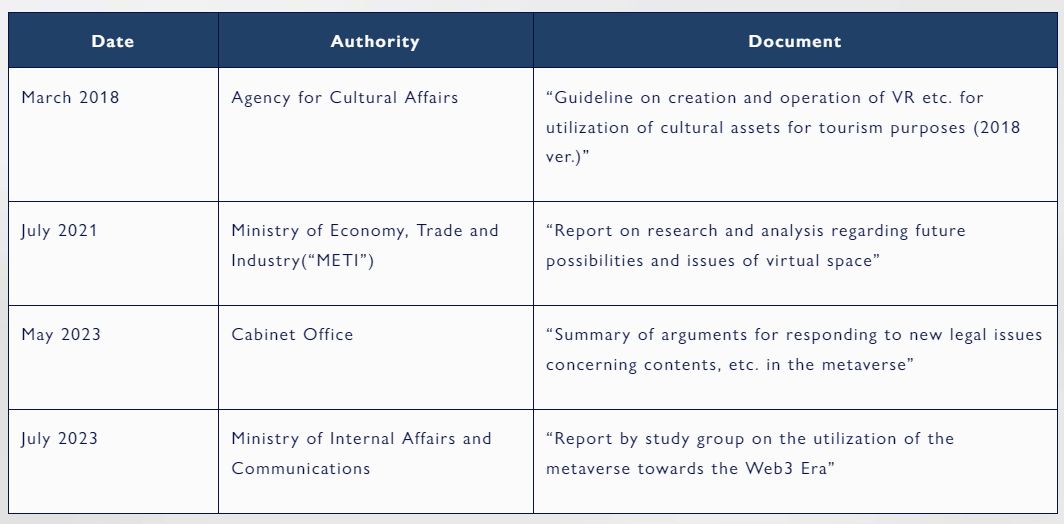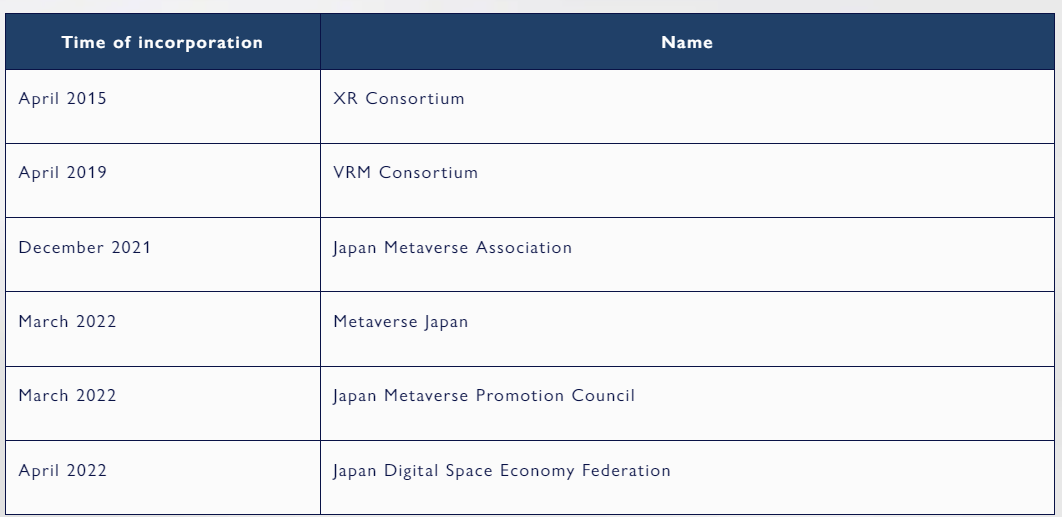Introduction
In recent years, the use of metaverse and extended reality (XR) technology has been spreading in a variety of fields worldwide on the back of the improvement of rendering and processing capabilities of computers. This digital shift accelerated during and as a result of the coronavirus pandemic. Last October, the 4th virtual Halloween event in a metaverse rendering of the Shibuya district of Tokyo (“Virtual Shibuya”) was held and a total of 1.5 million people took part. Japan, with its Manga and Anime industries as prolific creators of (digital) content, has a particular affinity for metaverse and XR technology. As companies are considering the use of metaverse and XR technology for more general business processes, discussion of the associated legal issues has been developed. This newsletter will give an overview on these recent trends from a legal perspective.
Japanese law on the metaverse and XR business
In Japan, there is no law which comprehensively governs the business use of metaverse and XR technology. It is therefore of key importance to analyze how existing law applies in this context. Given the diversity of the potentially applicable laws, the major legal issues are as follows.
Existing Japanese law has, to a large extent, not been designed with emerging technologies such as metaverse and XR technology in mind. Consequently, there are some efforts to amend the law to appropriately deal with metaverse and XR-related business. For example, an amendment to the Unfair Competition Prevention Act, which enables right holders to claim damages against dealing in counterfeit goods, has entered into force in July 2023. This amendment clarifies that the Unfair Competition Prevention Act also applies to the counterfeit goods in the metaverse. While the law is therefore developing to adapt to the emergence of metaverse and XR technologies, at the moment there are still limited hard law answers to the issues that arise in this context.
Recent legal trends regarding metaverse and XR in Japan
In parallel to the increase of metaverse and XR-related business, Japanese authorities including local governments as well as private companies or organizations have increased their efforts to engage in development of the associated legal issues. One of the main tools of choice to sort out such issues are soft law solutions like guidelines. As these guidelines, prepared by both governments and private companies/organizations, are important for using metaverse and XR technologies in business, their development should be closely observed. Here we present the most important current trends:
Central government initiatives
Government authorities have held various meetings and, as a result of such meeting, published a number of documents, in particular the following.

Of these documents, the “Summary of arguments for responding to new legal issues concerning contents, etc. in the metaverse” (the “Summary of Arguments”) published in May 2023 in particular includes relevant considerations of various metaverse-related legal issues and is also useful for development of legal issues related to XR.
The contents of the Summary of Arguments are divided into the following four sections:
(1) Use and protection of intellectual property rights in real world and virtual space
Main consideration: Intellectual property rights regarding the construction of a world in the metaverse and digital items which are traded in the metaverse
(2) Rights of publicity regarding avatars
Main consideration: Rights to use one’s likeness and rights of publicity rights regarding avatars used in the metaverse
(3) Regulation of user behavior in the metaverse
Main consideration: Handling problems which arise from actions of users in the metaverse
(4) International jurisdiction and governing law
Main consideration: International jurisdiction and governing law related to the disputes between operators and users in the metaverse
All these issues covered in the Summary of Arguments are so extensive, and therefore the Summary of Arguments is highly important for those considering engaging in a metaverse business in Japan. In February 2024, the documents “the Major points of the Summary of Arguments” were published. These documents illustrate major topics in the Summary of Arguments to be considered by business operator of the metaverse and users of the metaverse. The Summary of Arguments acknowledges some of contents and interpretations should require further study, and therefore it is essential to continue monitoring future consideration by the relevant government authorities.
In addition, as the purpose of the Public-Private Cooperative Council (which consists of (i) related parties of private business operators, (ii) experts of law, contents and other related areas and (iii) managers of related ministries and agencies) is handling legal issues in the metaverse utilizing contents such as social networks and games, the Summary of Arguments does not provide considerations of certain business models or service types such as VR training, VR medical treatment and VR offices as well as AR (Augmented Reality). In addition to the issues discussed in the Summary of Arguments, when engaging in certain metaverse business models or services, attention should be paid to the applicable business regulations and regulatory issues. Depending on the sector, the relevant sector-specific legal perspective will be as important as the perspective on the particularities of metaverse and XR technology and law.
Local government initiatives
Local governments also consider legal issues related to the metaverse and XR, in particular the so-called “digital twin” which technology enables to reproduce real world in virtual space. For example, the Tokyo Metropolitan government has implemented the “Tokyo Digital Twin Project.” In March 2022, the Tokyo Metropolitan government published the roadmap for the project, stipulating a number of concrete steps and actions for introduction of digital twin to society including legal issues regarding the operation of digital twin under various laws. Such roadmap will be periodically updated in the near future. As Japanese local governments’ attempts related to digital twin are currently still in the early stages, close attention should be paid to future trends.
Private Companies initiatives
In Japan, the main players driving forward the metaverse and XR are private companies. Both on their own and in cooperations with others, companies are pushing the envelope, with industry groups playing a key role in these attempts.
The establishment of industry groups is especially common with regard to the metaverse and XR, as can be seen in the following.

In addition to efforts channeled through industry groups, public-private collaborations are increasingly becoming important. In November 2021, the “Virtualcity Consortium” was established by KDDI CORPORATION, TOKYU CORPORATION, Mizuho Research & Technologies, Ltd. and Future Design Shibuya. As METI and Shibuya City participate in Virtualcity Consortium as observers, the consortium can be considered an example of a rule-making public-private collaboration. The purpose of Virtualcity Consortium is to formulate guidelines and share information for the development of city-related metaverse projects based on the experience with the “Virtual Shibuya” event.
In April 2022, the Virtualcity Consortium published the first edition of its Virtual City Guideline. This guideline covers intellectual property rights, rights to use one‘s likeness and rights of publicity, personal information/privacy, the Telecommunications Business Act, financial regulations competition laws and various other industry laws. In July 2023, the Virtual City Guideline was updated as the second edition and its summary was also published in English※1. This guideline is useful for those considering launching a metaverse business in Japan.
Conclusion
As described above, Japanese authorities and private companies are making progress in facing and dealing the relevant legal issues regarding the metaverse and XR. In tandem with the improvement of other emerging technology like generative AI, rapid progress and change are to be expected in the areas of the metaverse and XR. Thus, it is essential to always stay abreast of the latest local developments.
Simon Clemens Wegmann of Gleiss Lutz also contributed to this article.
This news is republished from another source. You can check the original article here








